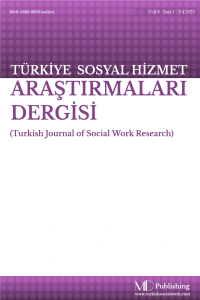Öz
In this study examines the potential contributions of ethnography to social work and social work to ethnography in terms of social work research, practice and education. In terms of the research, examining the interaction of the client-social worker was considered as a contribution of ethnography to social work, and being the voice of the voiceless by entering inaccessible areas was considered as a contribution of social work to ethnography. The relationship between ethnography and social work research is analyzed in terms of knowledge, skill-based similarity and ethical challenges. It is also stated that ethnography can contribute to social work research in terms of exploring causality. In terms of practice, it was stated that ethnography would contribute to exploring the professional lives of social workers and to concretize and develop micro, mezzo and macro connections. In terms of education, it was underlined that ethnography can contribute to the understanding of social problems, the development of observation-note-taking skills and the development of multiculturalism. As a result, it is recommended that ethnography should be included in the social work curriculum, field studies involving interaction to recognize disadvantaged groups should be developed, and social workers and educators should be encouraged to conduct ethnographic research.
Anahtar Kelimeler
Kaynakça
- Aarre, K. (1998). The child welfare debate in Portugal: A case study of a children’s home. In: Edgar IR and Russell A (eds) The Anthropology of Welfare. London, UK: Routledge.
- Alverson H, Alverson M., Drake R.E. (2001). An ethnographic study of the longitudinal course of substance abuse among people with severe mental illness. Community Mental Health Journal 36(6): 557–569.
- Alvesson, M., Gabriel, Y. and Paulsen, R. (2017). Return to Meaning: A Social Science with Something to Say, Oxford, Oxford University Press.
- Archer, J. (2009). Intersecting feminist theory and ethnography in the context of social work research. Qualitative Social Work, 8(2), 143-160.
- Ashencaen Crabtree, S. (2013). Research ethics and the moral enterprise of ethnography: Conjunctions and contradictions. Ethics and Social Welfare, 7(4), 359-378.
Öz
Bu çalışmada sosyal hizmet araştırması, uygulaması ve eğitimi açısından etnografinin sosyal hizmete, sosyal hizmetin de etnografiye potansiyel katkıları ele alınmıştır. Araştırma başlığında müracaatçı-sosyal hizmet uzmanı etkileşiminin incelenmesi etnografinin sosyal hizmete bir katkısı olarak, girilemez alanlara girerek sessizlerin sesi olmak ise sosyal hizmetin etnografiye bir katkısı olarak değerlendirilmiştir. Etnografi ve sosyal hizmet araştırması ilişkisi, bilgi-beceri temeli benzerliği ve etik zorluklar açısından incelenmiştir. Ayrıca etnografinin sosyal hizmet araştırmalarına nedenselliğin keşfi açısından katkı sunabileceği belirtilmiştir. Uygulama boyutunda etnografinin sosyal hizmet uzmanlarının mesleki yaşantılarını keşfetmeye ve mikro, mezzo ve makro bağlantılarını somutlaştırıp geliştirmeye katkı sağlayacağı ifade edilmiştir. Eğitim boyutunda ise etnografinin sosyal sorunların anlaşılması, gözlem-not tutma becerisinin gelişimi ve çokkültürlülüğün gelişimi noktalarında katkı sağlayabileceğinin altı çizilmiştir. Sonuç olarak etnografinin sosyal hizmet müfredatına dahil edilmesi, sosyal hizmet uygulaması öncesi dezavantajlı grupları tanımaya yönelik etkileşim içeren saha çalışmalarının geliştirilmesi, sosyal hizmet uzmanlarının ve eğitimcilerinin etnografik araştırmalar yapmaya teşvik edilmesi önerilmektedir.
Anahtar Kelimeler
Kaynakça
- Aarre, K. (1998). The child welfare debate in Portugal: A case study of a children’s home. In: Edgar IR and Russell A (eds) The Anthropology of Welfare. London, UK: Routledge.
- Alverson H, Alverson M., Drake R.E. (2001). An ethnographic study of the longitudinal course of substance abuse among people with severe mental illness. Community Mental Health Journal 36(6): 557–569.
- Alvesson, M., Gabriel, Y. and Paulsen, R. (2017). Return to Meaning: A Social Science with Something to Say, Oxford, Oxford University Press.
- Archer, J. (2009). Intersecting feminist theory and ethnography in the context of social work research. Qualitative Social Work, 8(2), 143-160.
- Ashencaen Crabtree, S. (2013). Research ethics and the moral enterprise of ethnography: Conjunctions and contradictions. Ethics and Social Welfare, 7(4), 359-378.
Ayrıntılar
| Birincil Dil | Türkçe |
|---|---|
| Konular | Danışmanlık, Refah ve Toplum Hizmetleri |
| Bölüm | Derleme Makaleler |
| Yazarlar | |
| Yayımlanma Tarihi | 30 Haziran 2025 |
| Gönderilme Tarihi | 11 Nisan 2025 |
| Kabul Tarihi | 30 Haziran 2025 |
| Yayımlandığı Sayı | Yıl 2025 Cilt: 9 Sayı: 1 |


